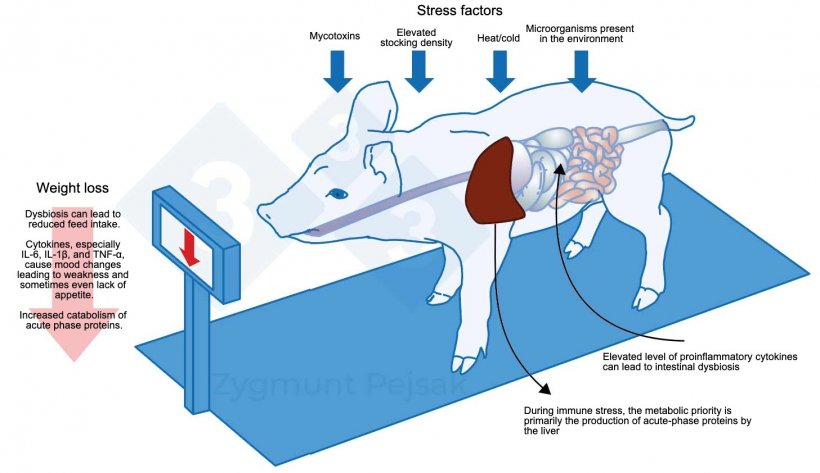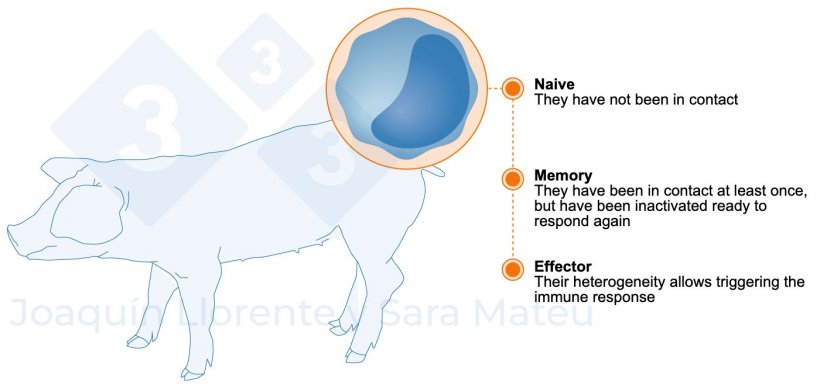Weaning is a crucial and highly stressful time in the piglet's life, marked by significant social, nutritional, and environmental changes. These changes can trigger an acute stress response, altering homeostasis and compromising the animal's health. In particular, weaning stress causes an increase in competitive behavior and cortisol concentrations, thereby inhibiting lymphocyte proliferation, natural killer (NK) cell activity, and neutrophil chemotaxis. Understanding the immunological mechanisms of piglets during this period is essential to improve their welfare and prevent infections.

Figure 1. One of the extra costs of prolonged alertness is decreased appetite and, consequently, a longer finishing period. Since the pressure of environmental stressors affects each animal differently, weight differentiation will occur between weaned piglets or finishing pigs of the same age. Weight differentiation between animals of the same age can have serious economic consequences. In addition, especially in young animals, a diet that does not contain essential nutrients to reinforce anti-infective resistance can make animals more vulnerable. Impact of stress on immune function, health, and productivity. Z. Pejsak, 2023, pig333.com.

It is also important to note that nutrition plays an important role in the immune response. The interaction of different dietary components together with other factors such as environment, health status, and genetics plays an important role in modulating the immune response.
The role of the immune system in viral infections
The relationship between the virus and the host is determinant in the development of a viral infection. A virus can cause serious disease or even be asymptomatic, depending on the host's immune response.
Viruses cause disease when they overcome the body's natural defenses and manage to evade the immune system. This can lead to cell destruction, inflammation, and immune responses that, in some cases, damage the body itself. Although the immune response is the best means of controlling viral spread, it can also contribute to the pathogenesis of infection.
Cellular mechanisms in piglet immunity
The piglet's immune system involves several key cell types that play essential roles in the defense against pathogens:
- T lymphocytes
- Th1 and Th2 lymphocytes
- Gamma interferon (IFN-γ)
1. T Lymphocytes
T lymphocytes are cells that circulate between the bloodstream, secondary lymphoid organs, and extralymphatic peripheral tissues. They are found in three functional states:
- Naive: They have not been in contact.
- Memory: They have been in contact at least once, but have been inactivated ready to respond again.
- Effector: Their heterogeneity allows triggering the immune response.

Figure 2. Functional stages of lymphocytes.
2. Effector Th lymphocytes
Effector Th lymphocytes are functionally heterogeneous and are differentiated by the activity of various cytokines. These lymphocytes play specific roles in immunity and can be classified according to their response:
- Naive Th lymphocytes: upon activation, they produce mainly interleukin-2 (IL-2).
- Effector Th lymphocytes: They generate a large number and variety of cytokines with diverse biological activities.
Th1 and Th2 responses are immune responses mediated by distinct subsets of Th lymphocytes, cells essential for the regulation of the immune system.
- Th1 differentiation
The Th1 response is associated with cell-mediated immunity. Its characteristics include:- Production of IL-2 and IFN-γ: These cytokines activate macrophages, essential in the defense against intracellular pathogens, such as certain viruses and bacteria.
- Promotion of inflammation: The Th1 response is key in the inflammatory response and is involved in some autoimmune diseases.
- Th2 differentiation
The Th2 response focuses on humoral immunity, or antibody production, and is essential for fighting extracellular parasites and allergens:- Production of IL-4, IL-5, and IL-10: These cytokines stimulate B cells to produce antibodies, especially IgG4 and IgE.
- Virus neutralization: IgG4 is effective in virus neutralization, while IgE activates mast cell degranulation.
In addition, the Th2 response can regulate and suppress certain aspects of cell-mediated immunity associated with the Th1 response, helping to balance the immune system.
Interferon and its importance
IFNγ is an essential cytokine in the immune response, as it modulates multiple immunological, antiviral, antitumor, and antiproliferative activities. In the immune system, IFNγ:
- Increases the cytotoxic and phagocytic activity of macrophages.
- Induces the expression of major histocompatibility complex (MHC) class I and II molecules in dendritic cells and other antigen presenting cells.
- Stimulates the development and differentiation of T-helper 1 (Th1) cells, which is crucial for controlling bacterial, fungal, viral, and parasitic infections.
The role of nutrition in modulating the immune system
Nutrition plays a key role in modulating the immune system, influencing the differentiation of Th1 and Th2 responses.

Omega-3 and omega-6 polyunsaturated fatty acids have opposite effects on inflammation and immune response.
- Omega-3s, found in fatty fish and certain vegetable oils, possess anti-inflammatory properties and can promote a Th2 response.
- In contrast, omega-6, found in vegetable oils such as sunflower or corn oil, may promote a pro-inflammatory Th1 response.
Vitamins D, A, and E also play immunomodulatory roles. Vitamin D can promote regulatory T-cell differentiation and suppress Th1 responses. Vitamin A and its derivatives (retinoids) can influence the Th2 response, while vitamin E, with its antioxidant properties, can affect the immune response.
Minerals such as zinc and selenium are essential for the immune system function. Zinc deficiency can alter the immune response and affect the Th1/Th2 balance, while selenium is crucial for regulating the immune response.
Probiotics and prebiotics are also important. Probiotics, such as certain strains of Lactobacillus and Bifidobacterium, and prebiotics that promote the growth of beneficial bacteria in the gut, can influence the immune response, promoting a Th1 response and enhancing cell-mediated immunity. Postbiotics, substances produced by probiotic cells, also have immunomodulatory and health-promoting effects.
Phytochemicals, bioactive compounds present in fruits, vegetables, tea, coffee, and spices, such as polyphenols, flavonoids, and carotenoids, have immunomodulatory and antioxidant effects and can influence the Th1/Th2 response.
Finally, dietary fiber can influence the composition of the intestinal microbiota and, therefore, the immune response. A diet rich in fiber can favor the production of short-chain fatty acids by the microbiota, which have anti-inflammatory effects and can influence the Th2 response.
Conclusions
Weaning is a critical and stressful period for piglets, characterized by social, nutritional, and environmental changes that can compromise their immune system. Understanding the immune mechanisms during this period and understanding how nutrition can be an ally in the immune response is essential to promote the health and well-being of piglets during this critical period.



